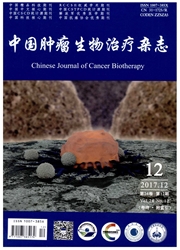

 中文摘要:
中文摘要:
目的:探讨靶向TLR4基因的小干扰RNA(small interference RNA,siRNA)对人肺腺癌A549细胞增殖和侵袭的影响。方法:设计并合成针对TLR4基因的3条siRNA(siRNA722、siRNA1673和siRNA2560)及1条与TLR4基因无同源性的阴性对照siRNA,采用Real-time PCR和Western blotting方法测定干扰后A549细胞中TLR4 mRNA及蛋白的表达水平,筛选出有效抑制靶基因表达的siRNA并确定最佳转染条件。TLR4特异性siRNA(TLR4-siRNA)转染A549细胞后,采用CCK-8法和Transwell小室法分别检测沉默TLR4对A549细胞增殖和侵袭能力的影响。结果:与阴性对照相比,siRNA1673在转染48 h后对TLR4 mRNA和蛋白表达的抑制最为明显[(0.45±0.03)vs(0.83±0.02),(0.23±0.06)vs(0.98±0.09);均P〈0.01]。TLR4-siRNA转染72 h后A549细胞增殖活性显著下降[(0.77±0.01)vs(0.98±0.11)、(0.93±0.04),P〈0.01];转染48 h后,TLR4-siRNA组A549细胞的侵袭细胞数明显少于阴性对照组[(23.60±2.88)vs(59.80±5.54)个,P〈0.01]。结论:TLR4-siRNA能够沉默A549细胞中TLR4基因表达,抑制A549细胞的增殖和侵袭能力,TLR4可能成为肺癌基因治疗的候选靶点。
 英文摘要:
英文摘要:
Objective:To investigate the effects of small interference RNA (siRNA)-mediated TLR4 silencing on pro- liferation and invasion of human lung adenocarcinoma A549 cells. Methods : Three TLR4-specific siRNAs ( siRNA722, siRNA1673 and siRNA2560) and one negative control siRNA were designed and chemically synthesized. One siRNA that could most effectively silence the TLR4 gene in A549 cells was chosen from the three test siRNAs based on their capacity of lowering TLR4 mRNA and protein levels revealed by real-time PCR and Western blotting analysis respectively. A549 cells were transfected with this most effective siRNA and the control siRNA respectively. Proliferation and invasion capaci- ty of the transfectants were assessed by CCK-8 assay and Transwell assay, respectively. Results: TLR4-siRNA1673 was the most effective siRNA which could significantly inhibit the expression of TLR4 at both mRNA (0.45 ± 0.03 vs 0. 83± 0.02, P 〈 0.01 ) and protein (0.23 ±0.06 vs O. 98 ± 0.09) levels at 48 h after transfection into A549 cells as compared with negative control siRNA. The proliferation of the TLR4-siRNA1673-transfected A549 cells was significantly inhibited compared with the NS-siRNA-transfected A549 ceils (P 〈 0.05 ). Similarly, the invasion capacity was significantly lower in the TLR4-siRNA1673-transfected A549 cells than in the NS-siRNA-transfected cells (23.60 ±2.88 vs 59.80±5.54,P 〈 0. 01 ). Conclusion: Sequence-specific and invasion ability of human lung carcinoma a putative therapeutic target for lung cancer. siRNA may effectively silence TLR4 expression and inhibit the proliferation cells in vitro. This preliminary observation suggests that TLR4 may serve as
 同期刊论文项目
同期刊论文项目
 同项目期刊论文
同项目期刊论文
 期刊信息
期刊信息
